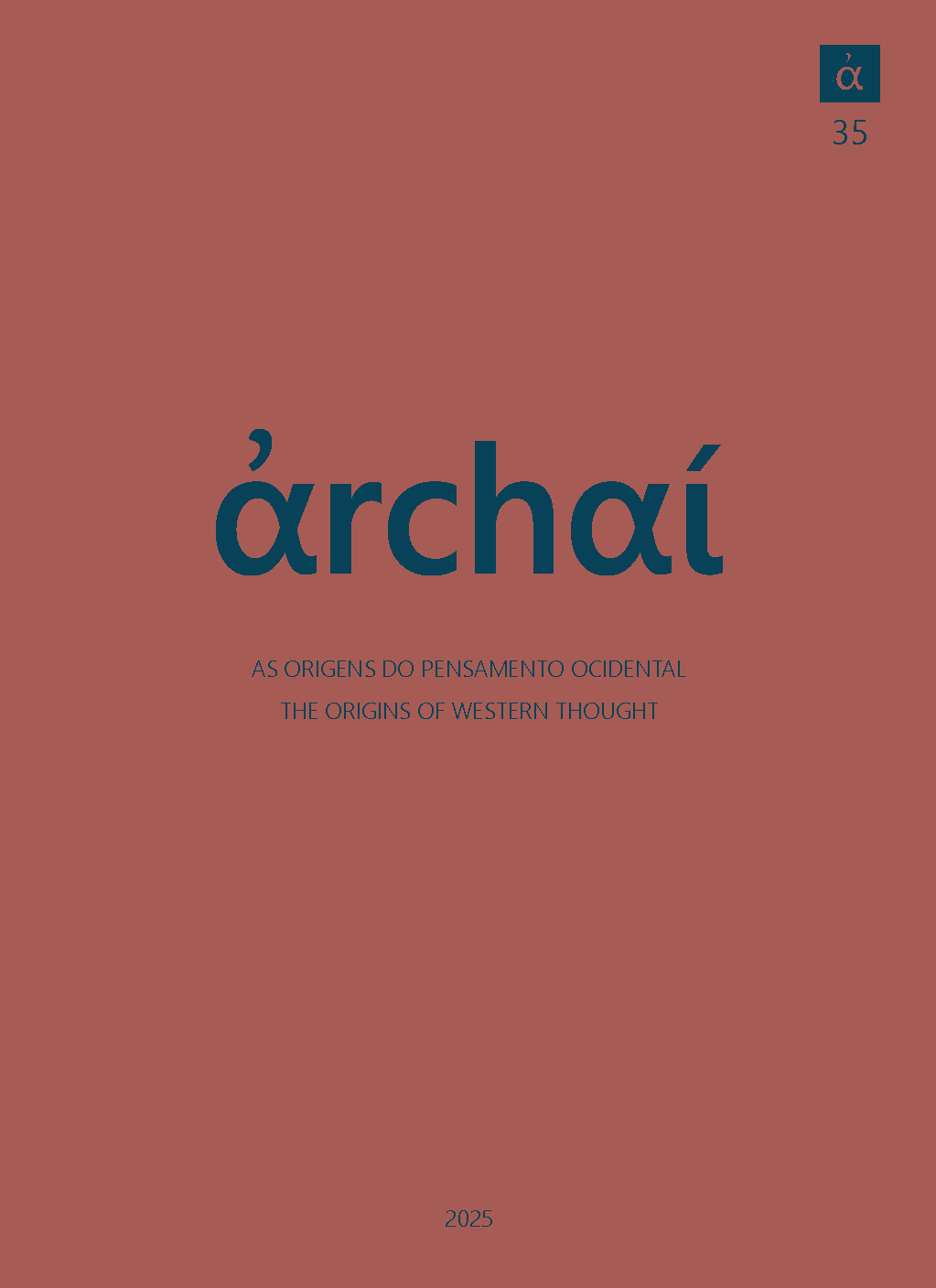“Science is nothing but perception” (Tht. 151e2-3). On the role of perception in the process of knowledge
DOI:
https://doi.org/10.14195/1984-249X_35_07%20Keywords:
Perception, Knowledge, Protagoras, homo mensura, TheaetetusAbstract
In the first part of the Theaetetus, Plato engages with the Protagorean position by interpreting the maxim “man is the measure” from a sensory perspective. The aim of the dialogue is to explore and define what constitutes knowledge, which is initially equated with perception. This contribution provides an analytical examination of the discussion among Socrates, Theodorus and Theaetetus (two mathematicians who represent Protagoras’ idea). Plato reinterprets the sophist’s thought and presents several specific criticisms, aiming to demonstrate the impossibility and danger of considering each individual’s perception as a valid basis for knowledge. At the same time, however, the philosopher acknowledges the sophist’s contribution, using it to better define the role of perception in knowledge. When considered alongside the assertions in the Seventh Letter, this discussion proves useful for clarifying a central aspect of Plato’s complex epistemological perspective.Downloads
References
BETT, R. (1989). The Sophists and Relativism. Phronesis 34, p. 139-169.
BOSSI, B. (2020). On Socrates’ Manipulative Dealing with Theaetetus’ First Claim about Knowledge. In: BOSSI, B.; ROBINSON, T.M. (eds.). Plato’s Theaetetus Revisited Berlin/Boston, De Gruyter, p. 65-88.
BRANCACCI, A. (2011). La «dottrina riservata» di Protagora (Plat. Theaet. 152c7-e1). Méthexis 24, p. 87-108.
BURNET, J. (1967). Theaetetus In Platonis opera (vol. 1): St I.142a-210d. Oxford, Clarendon Press (1ed. 1900).
BURNYEAT, M. (1990). The Theaetetus of Plato Hackett, Indianapolis/Cambridge.
CASERTANO, G. (2000). Caratteristiche e funzioni del λόγος, Sulla forma e la struttura del Teeteto In: MIGLIORI, M. (ed.). Il dibattito etico e politico in Grecia tra il V e il IV secolo Napoli, La Città del Sole, p. 337-381.
CASTAGNOLI, L. (2010). Ancient self-refutation, The Logic and History of the Self-Refutation Argument from Democritus to Augustine Cambridge, Cambridge University Press.
CHAPPELL, T. (2004). Reading Plato’s Theaetetus. Sankt Augustin, Academia Verlag.
CORRADI, M. (2013). Platone allievo di Protagora? Ancora sul grande discorso del Protagora. Peitho 4, p. 141-158.
CORRADI, M. (2012). Protagora tra filologia e filosofia. La testimonianza di Aristotele Pisa-Roma, Fabrizio Serra Editore.
DI LANZO, D. (2015). Il frammento 80 B1 DK di Protagora sul conoscere. Giornale Critico della Filosofia Italiana 11, p. 264-280.
EMILSSON, E. K. (1994). Plato’s Self-Refutation Argument in Thaetetus 171A-C Revisited. Phronesis 39, p. 136-149.
EUSTACCHI, F. (2021). Leggere i Sofisti: le diverse anime di una rivoluzione filosofica Brescia, Morcelliana-Scholé.
FERRARI, F. (2011). Platone. Teeteto (introduzione, traduzione e commento). Milano, Rizzoli.
FINE, G. (1996). Conflicting appearances, Theaetetus 153d-154b. In: GILL. C.; MCCABE, M.M. (eds.). Form and Argument in Late Plato Oxford, Oxford University Press, p. 105-131.
FORCIGNANÒ, F. (2020). Platone, Settima Lettera (introduzione, traduzione e commento). Roma, Carrocci.
GUTHRIE, W. K. C. (2005). The Sophists Cambridge, Cambridge University Press .
KETCHUM, R. J. (1992). Plato’s “Refutation” of Protagorean Relativism: Theaetetus 170-171. Oxford Studies of Ancient Philosophy 10, p. 73-105.
MAFFI, E. (2014). Lo spazio della filosofia. Una lettura del Teeteto di Platone Napoli, Loffredo Editore.
MIGLIORI, M. (2013). Il Disordine ordinato: la filosofia dialettica di Platone (2 vols.). Brescia, Morcelliana.
POLANSKY, R. M. (1992). Philosophy and Knowledge. A Commentary on Plato’s Theatetetus. London/Toronto, Bucknell University Press; Lewisburg, Associated University Presses.
REALE, G. (ed.) (2000). Platone. Tutti gli scritti Milano, Bompiani.
REALE, G. (ed.) (2006). I Presocratici. (Prima traduzione integrale con testi originali a fronte delle testimonianze e dei frammenti nella raccolta di Hermann Diels e Walter Kranz). Milano, Bompiani.
SEDLEY, D. (2011). La levatrice del Platonismo. Testo e sottotesto nel Teeteto di Platone Milano, Vita e Pensiero.
TAGLIAPIETRA, A. (ed.) (1994), Platone. Teeteto (introduzione di Salvatore Natoli e Saggio critico di Davide Spiano). Milano, Feltrinelli.
TRABATTONI, F. (2020). Peritrope Once Again. In: BOSSI, B.; ROBINSON, T. M. (eds.). Plato’s Theaetetus Revisited . Berlin/Boston, De Gruyter , p. 89-106.
TRABATTONI, F. (ed.) (2018). Platone. Teeteto (traduzione di Andrea Capra). Torino, Piccola Biblioteca Einaudi.
ZILIOLI, U. (2007). Protagoras and the Challenge of Relativism. Plato’s Subtlest Enemy Aldershot, Ashgate Publishing.
ZILIOLI, U. (2022). Protagoras’ Secret Doctrine: Theaetetus 152a-157c - Relativism, Indeterminacy and Ineffability. In: ZUCCA, D. (ed.). New Explorations in Plato’s Theaetetus. Leiden/Boston, Brill, p. 117-132.
ZUCCA, D. (2022). Plato, Theaetetus 169e8-171c7: The Self-Refutation Argument and What Protagoras Is Right About. In: ZUCCA, D. (ed.). New Explorations in Plato’s Theaetetus. Leiden/Boston, Brill , p. 133-160.
Downloads
Published
How to Cite
Issue
Section
License
Copyright (c) 2025 Francesca Eustacchi

This work is licensed under a Creative Commons Attribution 4.0 International License.
Given the public access policy of the journal, the use of the published texts is free, with the obligation of recognizing the original authorship and the first publication in this journal. The authors of the published contributions are entirely and exclusively responsible for their contents.
1. The authors authorize the publication of the article in this journal.
2. The authors guarantee that the contribution is original, and take full responsibility for its content in case of impugnation by third parties.
3. The authors guarantee that the contribution is not under evaluation in another journal.
4. The authors keep the copyright and convey to the journal the right of first publication, the work being licensed under a Creative Commons Attribution License-BY.
5. The authors are allowed and stimulated to publicize and distribute their work on-line after the publication in the journal.
6. The authors of the approved works authorize the journal to distribute their content, after publication, for reproduction in content indexes, virtual libraries and similars.
7. The editors reserve the right to make adjustments to the text and to adequate the article to the editorial rules of the journal.














